|
TRANSLATE THIS ARTICLE
Integral World: Exploring Theories of Everything
An independent forum for a critical discussion of the integral philosophy of Ken Wilber
  Frank Visser, graduated as a psychologist of culture and religion, founded IntegralWorld in 1997. He worked as production manager for various publishing houses and as service manager for various internet companies and lives in Amsterdam. Books: Ken Wilber: Thought as Passion (SUNY, 2003), and The Corona Conspiracy: Combatting Disinformation about the Coronavirus (Kindle, 2020). Frank Visser, graduated as a psychologist of culture and religion, founded IntegralWorld in 1997. He worked as production manager for various publishing houses and as service manager for various internet companies and lives in Amsterdam. Books: Ken Wilber: Thought as Passion (SUNY, 2003), and The Corona Conspiracy: Combatting Disinformation about the Coronavirus (Kindle, 2020). 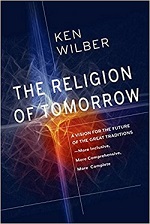 Frank Visser, CLIMBING THE STAIRWAY TO HEAVEN
Frank Visser, CLIMBING THE STAIRWAY TO HEAVENA 7-Part Review of Ken Wilber's The Religion of Tomorrow (2017) Part I: The Involution/Evolution Cosmology Part II: From Atom to Atman Part III: A More Adequate Spectrum of Colors? Part IV: What Is It Like to Be a Super-Nova? Part V: Rational Reasons to Believe in Spirit? Part VI: Is Darwin Really 'On Our Side'? Part VII: Climbing the Stairway to Heaven THE WHOLE SERIES: FREE DOWNLOAD AS PDF Review of "The Religion of Tomorrow", Part IIFrom Atom to AtmanKen Wilber's Religious View of EvolutionFrank Visser
Why, then, I would ask, is Ken Wilber not able to tell us one interesting thing about how the elements were formed?
Ken Wilber's latest book The Religion of Tomorrow (2017) argues, again, for a religious view of evolution. Cosmic evolution is driven by "the Spirit of Evolution" which he prefers to call "Eros": a cosmic drive towards complexity, consciousness and compassion. This view is completely at odds with the standard scientific view of evolution, which doesn't invoke such higher powers to understand why things have evolved in the first place. Does it matter which view we choose? Are there good reasons to believe in this religious view? In Wilber's mystical worldview, Spirit is not only behind every process in nature and culture, but It can be experienced, merged and identified with by the advanced meditator as the "Supreme Identity", the "Ground of Being", "Atman", "what was there before the Big Bang". This constitutes for him a "proof of God", unavailable to rational philosophy or empirical science. These are quite extraordinary claims, that need to be assessed with a sober mind. 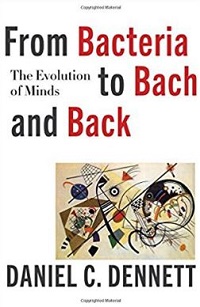
An interesting way to do this is by comparing and contrasting Wilber's latest literary production with the approach (I would almost say "spirit") of a similar book from the science field: Daniel Dennett's From Bacteria to Bach and Back (2017). For over 50 years this arch-reductionist (in integral circles the usual put-down) or ultra-Darwinist (which he would take as a compliment) has tried to explain consciousness and evolution on naturalistic terms.[1] By way of playful contrast we could call Wilber's view of evolution "From Atom to Atman", given his preference for Eastern philosophies and also because one of his first books on developmental psychology was called The Atman Project (1980). Though Wilber doesn't use the term "Atman" that much these days, the notion of a spiritual background behind natural and cultural evolution has never been absent from his writings. Given the fact that Wilber is a believer in involution—implying that we have come from Spirit and will return to It some time[2]—the proper phrase would even be "From Atman to Atom and Back." (first comes involution, followed by evolution) Another favorite phrase Wilber is fond of using is "from dirt to Divinity", another nice alliteration.[3] A few years ago, in an introductory talk at the third Integral Spiritual Experience Seminar ("Kosmic Creativity", held December 28th, 2011 - January 1st, 2012), Wilber made a rather "accommodationist" comment when briefly, and casually, discussing the genesis of the elements, from Hydrogen to the heavier elements, and the possible role played by spiritual factors in this cosmic process:
Whether we see this in a spiritual way or in a more material way, the fact is there is creative emergence. There is evolution. Going all the way back to the earliest particles or strings or whatever physics is suggesting...
Ken Wilber is of course not a physicist or a chemist. But it is obvious that these examples serve a didactic function in the context of such a spiritual seminar. His message is: even science is on board if you look at it through a spiritual lens.[4] Does it not really matter what the actual mechanism of evolution is? Do we have a common ground here between a religious or a scientific view of evolution, in that both see a trend towards greater complexity? Wilber seems to hint at this in the following passage from The Religion of Tomorrow:
Given this overall, absolutely unmistakable direction to greater and greater wholeness, greater and greater sensitivity, greater and greater consciousness—whether this is an inherent tendency of the universe itself or the product of chance and necessity doesn't matter, just look where it is obviously headed! (to more of the same, surely, with something like a superhuman Supermind looming on our collective horizon, whispering into our ears, "Just keep coming, the Kingdom is at hand")—how can we doubt the simple record of what Whitehead calls "the creative advance into novelty," with each new creative step pushing more and more in this utterly obvious direction? (p. 246) [4] (emphasis added)
However, the difference between a religious or a scientific view of the cosmos seems stark and unbridgeable. It is between a caring and even compassionate universe on the one hand, and a cold, indifferent universe on the other.[5] To some, the scientific worldview is depressing and without meaning. But is it really relevant for our discussion that the religious view of evolution provides meaning and comfort (after all: we are heading towards Omega!), whereas the scientific view comes across as meaningless and depressing? Is the universe really full of intelligence, as Wilber claims,
[T]he universe certainly has being, and it certainly has intelligence and there's no reason whatsoever it can't be approached as such... Moreover, just thinking of the trillions of choices that went into the unfolding of evolution at large is to realize the staggering Intelligence that is present in the being of this universe (if nothing else, simply as the self-organizing and self-transcending drive of Eros, or Spirit-in-action), and to realize that you can approach that Intelligence and directly resonate with it is a profound and powerful spiritual path." (p. 172-3)
This quote breathes a strange, inflated type of reasoning: "certainly... certainly... no reason whatsoever..." And has cosmic "evolution at large" really been a matter of "choices"? This is all very debatable, and should be debated instead of preached to the converted. And that Intelligence is also "staggering"? Downgrading this lofty spiritual vision to a more mundane one, supposedly acceptable to modernity and postmodernity, Wilber uses phraseology like "simply as the self-organizing and self-transcending drive of Eros, or Spirit-in-action". How "simply" is that exactly? The existence of such a drive, even among complexity scientists, is by far not a done deal. Actually, self-organization is one of these concepts that Wilber has co-opted to promote his spiritual vision of the universe and to give it some scientific standing. Case Study: The Genesis of the ElementsActually, since we're talking about atoms and particles ("or whatever physics is suggesting"), the question of the genesis of the elements (Hydrogen, Oxygen, Uranium etc.) is a good case in point to differentiate the religious from the scientific worldview. In The Religion of Tomorrow Wilber often claims that his model has relevance "all the way back to be Big Bang" and even before that moment in time, given his belief in involution.[2] Briefly, he suggests that subatomic particles have been laid down by involution, thereby reaching it's lowest point, upon which the upward process of evolution takes over and creates all the different elements in nature. A layman would have no clue about the question why we have so many elements. Recently, four new elements have even been created by scientists, bring the total number of elements to 118). The seventh row of the Periodic Table has been filled up, and some think that this completes our search. Others expect there could be even heavier elements, but they would be very unstable. Even more intriguing: going further down that road of finding new elements, we could encounter "islands of stability" (around hypothetical element #122), full of elements that are more stable then their predecessors. When finally hypothetical element #173 is reached, we will enter an area "where things get seriously weird"–a fine understatement. 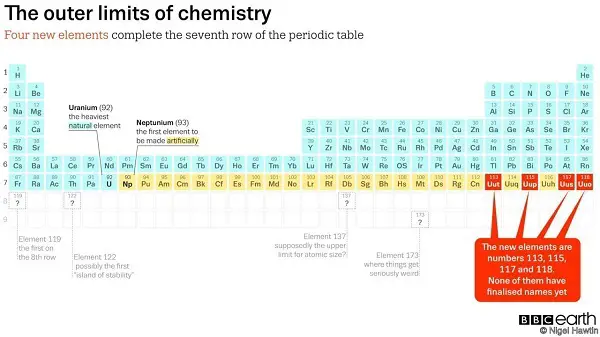
Source: “How many more chemical elements are there for us to find?” (BBC Earth)
What matters is that this whole question of how the elements we know of were formed at the time of the Big Bang, during our cosmic history, or were created in recent decades by ourselves(!), has been a fascinating tale of human perseverance and ingenuity. The excitement and joy of discovery is completely absent in the spiritual view of things: in Wilber's universe novelty can't arise unless introduced by Spirit or Eros. Yes, from Hydrogen to Ununoctium (element #118), we can see some kind of transcendence in progress, even following Wilber's beloved "transcend-and-include" pattern, where heavier elements "include" lighter elements by adding electron shells and adding neutrons. But this abstract understanding should never be mistaken for a true scientific model. This sequence is not driven by a single do-it-all Force (though in most cases, the best candidate would be gravity anyways). In fact, the scientific model of the genesis of the elements is much more interesting. In general, they were cooked due to gravitational compression in the core of exploding stars, but even here there is not a simple gradual and step-wise process. Some elements even have multiple sources of origin. Some new elements were even created by atomic bomb explosions. There has been even a kind of arms race between the US and Russia about who were the first to create (and name) the new super-heavy artificial elments. The different natural processes that lead to the formation of elements are: (Wikipedia on Nucleosynthesis):
So how does, at the level of the elements, complexity in the natural world arise? Through natural processes that are well understood, not through a cosmic "drive towards complexity" or Eros. Suggesting otherwise is bad poetry.[6] I am bring this up because in his book, Wilber claims the deepest possible insight into world processes. In his model of spiritual development, we get presented with many lofty spiritual structures and states of consciousness—the so-called "supra-integral structure-stages: para-mind, meta-mind, Overmind—culminating in the stage of Supermind. In the highest stages, one not only "knows" things, but sees them, feels them, is-one-with them. About this Supermind stage, "the highest structure of consciousness yet to begin to emerge", Wilber tells us, apparently from experience:
Supermind, at this point in evolution, seems to be the highest structure of consciousness yet to begin to emerge, and it is combined with the highest state of consciousness yet to emerge (nondual Suchness). The result is a seeing/feeling/witnessing/being interwoven stream of Whole after Whole after Whole after Whole, which instantaneously present themselves to the mind's eye, or nondual Awakened Awareness, in a spontaneous, effortless, dynamic fashion—while Supermind is also able to concentrate on individual particulars at any point, and to do so in the timeless Now, while also including the entire history of a holon all the way back to the Big Bang. All of this is a constant feature of Supermind consciousness—the entire Kosmos is aware of the entire Kosmos, in the Kosmos, through the Kosmos, as the Kosmos. (p. 214-5)
He doesn't say so explicitly, but Wilber pretends to speak to us from that spiritual domain. Why, then, I would ask, is he not able to tell us one interesting thing about how the elements were formed? "Supermind is also able to concentrate on individual particulars at any point." What's the point of claiming deeper insight, when it never gets beyond these abstractions? And this is still only the lowest level of complexity! Wilber's claims to knowledge go even beyond this—if that can even be imagined. Advanced meditators, he believes, will be able to contact the deepest levels of Reality, Emptiness, Suchness, Godhead, Brahman, Spirit—or whatever term we prefer. Isn't that a little bit over the top? It is true that the spiritual traditions of the world were full of this God-talk: the Supreme Identity, Godhead, Brahman, Tao, the Absolute, etcetera. But are we justified in seeing this as legitimate claims to knowledge based on introspection of a handful of individuals? How likely is that? What did the mystics of the past actually know about the cosmos they lived in, when they looked up to the starry sky at night? Is "what happened before the Big Bang" really a domain you want to enter into with your timeless I AM-awareness? I am sure they found a lot of interesting details about the workings of human consciousness, but outside that domain? 
The nucleus of element 117 (Credit: Lawrence Livermore National Laboratory/Science Photo Library)
The Crossroads We Are At NowThe matter at hand is, which type of knowledge is more valid? Which strategic approach to solving nature's mysteries should we follow? Are we justified in postulating a cosmic Eros at work in natural and cultural evolution? Or should we take a more modest and agnostic position, and try to work our way through the details of reality without such a pre-conceived "solution"? For me, the second option is both more honest and informative. Both views have their riddles and proposed solutions. As I wrote earlier in an earlier essay, "Some Paradoxes of Evolution"[7], this is the crossroads we stand at: If there's a driving Force behind all of evolutionary life, as spiritualists like Ken Wilber ("Eros in the Kosmos") and Andrew Cohen ("the God impulse") argue, the burning question then becomes: why didn't everything evolve? Why only some species? For example, why didn't all fish go onto the land, if that was such a good design-idea? Was this Force not strong enough to influence all of life? Or was it directed towards only some of the species around? This doesn't seem a very plausible scenario, unless one wants to believe in some updated from of creationism. But if there isn't such a Force, as science holds, the opposite question arises: how did anything evolve at all? Why did only some species evolve towards higher complexity? Natural selection seems to explain this. But even if evolution through natural selection (for eukaryotes) is true, why didn't bacteria go down that road? Apparently, they did not evolve because the natural barriers are too high. Only the symbiosis of bacteria and primitive unicellular organisms managed to take that barrier. Or put differently, from my ITC paper "The Spirit of Evolution Reconsidered", in an endnote[8]: [4] Also, the scientific or "reductionistic" view of evolution is best seen as a Null-hypothesis: Integral students have responded to the above train of thought in several different ways. Some were very clear about this: integral philosophy doesn't need any Eros in the Kosmos, it can manage very well with the core concepts of AQAL (quadrants, levels, lines, types, the self, pathology, therapy, etc.), without this religious superstructure. Taking this pragmatic, this-worldly approach is something I can understand, given the problems an Eros-guided universe introduces. That does raise the question about the consistency of Wilber's integral philosophy. However, to my mind, the spiritual dimension has been an integral (pun intended) part of Wilber's writing from his very first book, four decades ago by now. Others have defended Wilber against my "flatland" objections by pointing to other fields of knowledge that should be taken into account before closing the accounts on evolution: introspection, phenomenology, systems theory etc. I have never found these defenses defensible. The assumption behind it is that we understand something only when "we take everything into account". That, however is exactly what Wilber claims to have done, looking at the facts of evolution "from on high". The results are not at all promising. Exploring a scientific, "reductionistic" approach to evolution and the bigger questions of life and mind, Daniel Dennett has presented a summary of half a century of dedicated thought in his From Bacteria to Bach and Back (2017). We are entering completely different territory here. No arguments by proclamation, but subtle approaches, retractions and new, fresh approaches can be found here. Dennett provides a healthy antidote to Wilber's airy-fairy musings. Here, we are with both feet on the ground. Here, large scale evolution towards complexity is not denied, but the mechanism behind all idealistic mind-first explanations is contested and brilliantly exposed as empty. We see the blind spot in Wilber's scheme of the world exposed here with great clarity. Dennett argues for a close look at how things have come about during evolution, even if that goes against our deeply cherished notions of who and what we are (by getting a feel for "how come" vs "what for" questions). 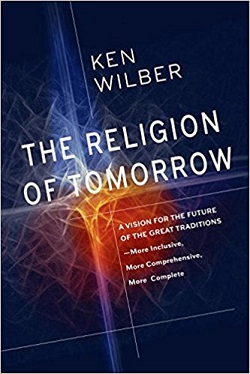 Hardcover, Shambhala, 2017, 806 pages. Where Wilber caters to the "creationist sentiments" of lay people ("we went from Hydrogen to humans—isn't that astonishing? Isn't it obvious something must have guided this process?"), Dennett is content not to know everything, but delights in thinking of ways to tackle and solve the intricate problems of nature. What is more, he is one of the few philosophers who sees merit in applying the meme concept to various problems of culture. Ironically, Wilber has adopted the value-meme concept from Spiral Dynamics, but both of these knowledge communities seem to have ignored where the meme concept comes from: the much dreaded reductionist Richard Dawkins. Dennett explores many aspects of this idea, and devoted a separate chapter to the many types of criticism the meme concept has received over the years. Ken Wilber, who changed the color-scheme he originally adopted from Spiral Dynamics ("it is totally off, according to the Tantric traditions", he now says on p. 692), seems more interested in demarcating his particular interpretation of the value-memes (with some new colors) from those of Spiral Dynamics, claiming to have the better system now, because... it matches the colors of the rainbow (seriously),
The order of colors is important for the traditional psychologies, because each level is said to correspond to a subtle energy, which can also be found in nature, such as in a rainbow, so the order of the colors of levels of altitude, unlike those used by Spiral Dynamics, should match the order found in a rainbow. (p. 349)[9]
That's exactly what I mean, such a difference in spirit: explaining the spiritual doctrines from on high or exploring the mysteries of nature with a genuine eye for detail. Especially Dennett's references to philosopher of biology Peter Godfrey's "Darwinian Spaces" is tantalizing in their applicability for both gene and meme worlds in nature and culture.[9] Integralists will shout "Reductionism!" and "Quadrant Absolutism!", but given these professional treatments of evolution, Wilberian customary put downs against neo-Darwinism, which occur in The Religion of Tomorrow on several pages ("unlikely", p. 217, and even "moronic", p. 219), it is not difficult to choose for expertise when it comes to the topic of evolution. We don't need a top-heavy, top-down approach from on high but an empirically sensitive bottom-up approach to find out how we got Here from There. 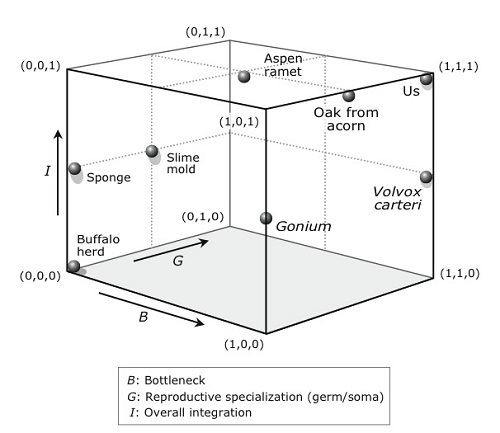
Darwinian Space with Other Dimensions, Peter Godfrey-Smith
(Daniel Dennett, From Bacteria to Bach and Back, 2017, p. 144) NOTES[1] Frank Visser, "Eros as Skyhook: Ken Wilber Meets Daniel Dennett", www.integralworld.net [2] Frank Visser, "The involution/evolution cosmology: Ken Wilber Holds On to an Outdated Scheme of Existence", www.integralworld.net [3] Frank Visser, "'From Dirt to Divinity': Ken Wilber's pre-Darwinian Understanding of Evolution", www.integralworld.net [4] Frank Visser, "Heavy Elements: Why Integral Physics is Lost in Space", www.integralworld.net [5] According to science, we literally live in a cold universe: the average temperature in the cosmos is a few degrees above absolute zero, or 3 degrees Kelvin—which translates to minus 270.45 Celsius or minus 457.87 degrees Fahrenheit). Who said the cosmos is "fine tuned for life"? [6] The whole story, with all its surprising twists and turns, can be found in: Marcus Choun, The Magic Furnace: The Search for the Origin of Atoms (Vintage, 2000) [7] Frank Visser, "Some Paradoxes of Evolution", www.integralworld.net [8] Frank Visser, "The 'Spirit of Evolution' Reconsidered: Relating Ken Wilber's view of spiritual evolution to the current evolution debates", Paper presented at the Integral Theory Conference 2010, Saturday, July 31st, 2010 - John F. Kennedy University, San Francisco (Honorable Mention Paper in the Category Constructive Criticism). [9] If we follow that train of rainbow-talk and tie together the systems of yoga-psychology, Wilber and Spiral Dynamics, we get the following picture. Strangely, the color YELLOW seems missing from Wilber's color-palette, and the reddish colors get an extraordinary amount of emphasis ("totally off, anyone?"). See also: Frank Visser, "A More Adequate Spectrum of Colors?", www.integralworld.net, June 2017 [10] Daniel Dennett, Homunuli Rule: Reflections on Darwinian populations and natural selection by Peter Godfrey Smith, Biol. Philos, 2010, available from Dennett's website.
|